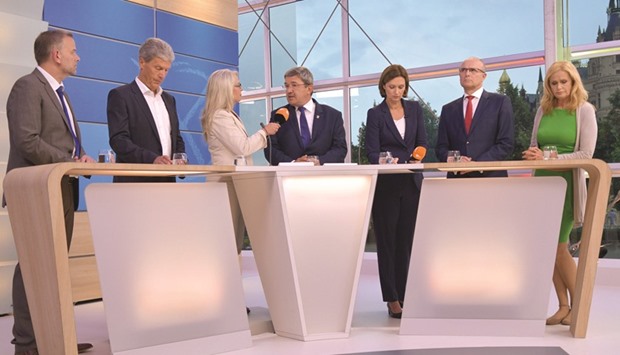Germany’s anti-migrant populists made a strong showing at yesterday’s state polls, scoring ahead of Chancellor Angela Merkel’s party as voters punish the German leader over her liberal refugee policy.
The xenophobic Alternative for Germany (AfD) obtained around 21% in its first bid for seats in the regional parliament of Mecklenburg- Vorpommern (Mecklenburg-Western Pomerania in English), according to exit polls shortly after voting ended.
Merkel’s Christian Democratic Union (CDU), meanwhile, garnered just 19% in its worst ever showing in the northeastern state, while the Social Democrats maintained top place with around 30%.
Calling it a “proud result”, Leif-Erik Holm, AfD’s lead candidate said: “And the cream of the cake is that we have left Merkel’s CDU behind us ... maybe that is the beginning of the end of Merkel’s time as chancellor.”
Although the former Communist state is Germany’s poorest and least populous, it carries a symbolic meaning as it is home to Merkel’s constituency Stralsund.
The polls are also held exactly a year after the German leader made the momentous decision to let in Syrian and other migrants marooned in eastern European countries.
Although she won praise at first, the optimism has given way to fears over how Europe’s biggest economy will manage to integrate the 1mn people who arrived last year alone.
Her decision has left her increasingly isolated in Europe, and exposed her to heavy criticism at home, including from her own conservative allies.
In the sprawling farming and coastal state of Mecklenburg- Vorpommern, where economic regeneration and jobs used to top residents’ concerns, the issue of refugees and integration has become the deciding factor for one in two voters.
“I am voting AfD. The main reason is the question over asylum-seekers,” said a pensioner and former teacher who declined to be named.
“A million refugees have come here. There is money for them, but no money to bring pensions in the east to the same levels as those of the west,” he said, referring to the lower retirement payments that residents of former Communist states receive compared to those in the west.
Compared to other parts of Germany, the northeastern state hosts just a small proportion of migrants under a quota system based on states’ income and population – having taken in 25,000 asylum-seekers last year.
Most of them have already decided to abandon the state, preferring to head “where there are jobs, people and shops”, said Frieder Weinhold, CDU candidate.
But he acknowledged that the “migration policy has sparked a feeling of insecurity among the people”.
After a series of attacks by asylum-seekers in July – including two claimed by the Islamic State (IS) organisation – the mood has also darkened.
If the results were confirmed, the AfD, which was founded in 2013, would enter yet another regional parliament.
The party is now represented on the opposition benches of half of Germany’s 16 regional parliaments.
Leading members of the party have sparked outrage over insulting remarks, including one disparaging footballer Jerome Boateng, of mixed German and Ghanaian descent, as the neighbour no German wants.
Days ahead of yesterday’s vote, Merkel urged the population to reject AfD.
“The more the people who go to vote, the less the percentage won by some parties that, in my view, have no solution for problems and which are built mainly around a protest – often with hate,” the chancellor said.
The chancellor, who is attending the G20 summit in the Chinese city of Hangzhou, did not vote in the polls as her main residence is in Berlin.

(From left) Leif-Erik Holm, the top candidate of the AfD; Helmut Holter, the top candidate of the Linke; Lorenz Caffier, the top candidate of the CDU; Erwin Sellering, the Mecklenburg-Vorpommern state premier and the top candidate of the Social Democratic Party; and the top candidate of the Green party, Silke Gajek, attend a post-election TV debate after exit polls were announced. Germany’s anti-migrant populists AfD recorded strong results of around 21% at state elections yesterday, unseating Chancellor Angela Merkel’s CDU party from second place, exit polls showed.
